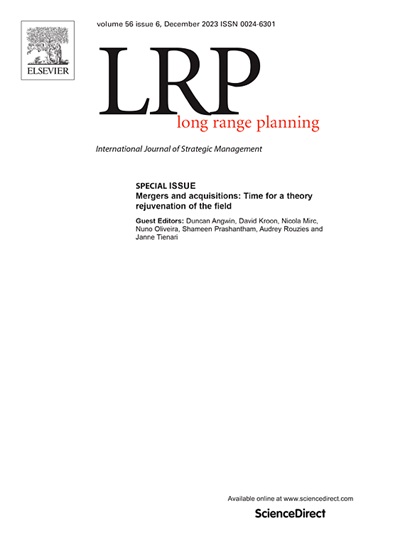在中国创造高质量的创新:政治关系和正式制度的作用
IF 6.3
2区 管理学
Q1 BUSINESS
引用次数: 0
摘要
中国等新兴经济体的企业越来越重视高质量的技术创新,以提高全球竞争力。虽然高管政治关系在提高企业创新绩效方面的作用已得到充分证明,但它们对促进高质量技术创新的具体贡献仍未得到充分探讨。本研究探讨了政治关系如何影响中国的创新质量,并分析了特定企业和地区的制度如何影响创新的有效性。以中国制造业企业为样本,研究结果表明,政治关系通过提供金融、技术和市场特定优势,促进了高质量的创新。然而,它们的影响受到商业集团隶属关系、外资所有权和地区一级知识产权执法等正式制度的显著调节,这些制度减少了企业对政治关系的依赖。这些发现有助于我们细致入微地理解非正式网络和正式制度在推动新兴经济体创新质量方面的相互作用。本文章由计算机程序翻译,如有差异,请以英文原文为准。
Creating high-quality innovations in China: The role of political ties and formal institutions
Firms in emerging economies, such as China, are increasingly prioritizing high-quality technological innovations to boost global competitiveness. While the role of executive political ties in enhancing firms' innovation performance is well-documented, their specific contribution to fostering high-quality technological innovations remains underexplored. This study investigates how political ties influence innovation quality in China and analyses how certain firm- and region-specific institutions shape their effectiveness. Drawing on a sample of Chinese manufacturing firms, the findings reveal that political ties enhance high-quality innovations by offering financial, technological, and market-specific advantages. However, their effect is significantly moderated by formal institutions such as business group affiliation, foreign ownership, and region-level intellectual property rights (IPR) enforcement, which diminish firms’ reliance on political ties. These findings contribute to a nuanced understanding of the interplay between informal networks and formal institutions in driving innovation quality in emerging economies.
求助全文
通过发布文献求助,成功后即可免费获取论文全文。
去求助
来源期刊

Long Range Planning
Multiple-
CiteScore
13.00
自引率
7.10%
发文量
75
期刊介绍:
Long Range Planning (LRP) is an internationally renowned journal specializing in the field of strategic management. Since its establishment in 1968, the journal has consistently published original research, garnering a strong reputation among academics. LRP actively encourages the submission of articles that involve empirical research and theoretical perspectives, including studies that provide critical assessments and analysis of the current state of knowledge in crucial strategic areas. The primary user base of LRP primarily comprises individuals from academic backgrounds, with the journal playing a dual role within this community. Firstly, it serves as a platform for the dissemination of research findings among academic researchers. Secondly, it serves as a channel for the transmission of ideas that can be effectively utilized in educational settings. The articles published in LRP cater to a diverse audience, including practicing managers and students in professional programs. While some articles may focus on practical applications, others may primarily target academic researchers. LRP adopts an inclusive approach to empirical research, accepting studies that draw on various methodologies such as primary survey data, archival data, case studies, and recognized approaches to data collection.
 求助内容:
求助内容: 应助结果提醒方式:
应助结果提醒方式:


